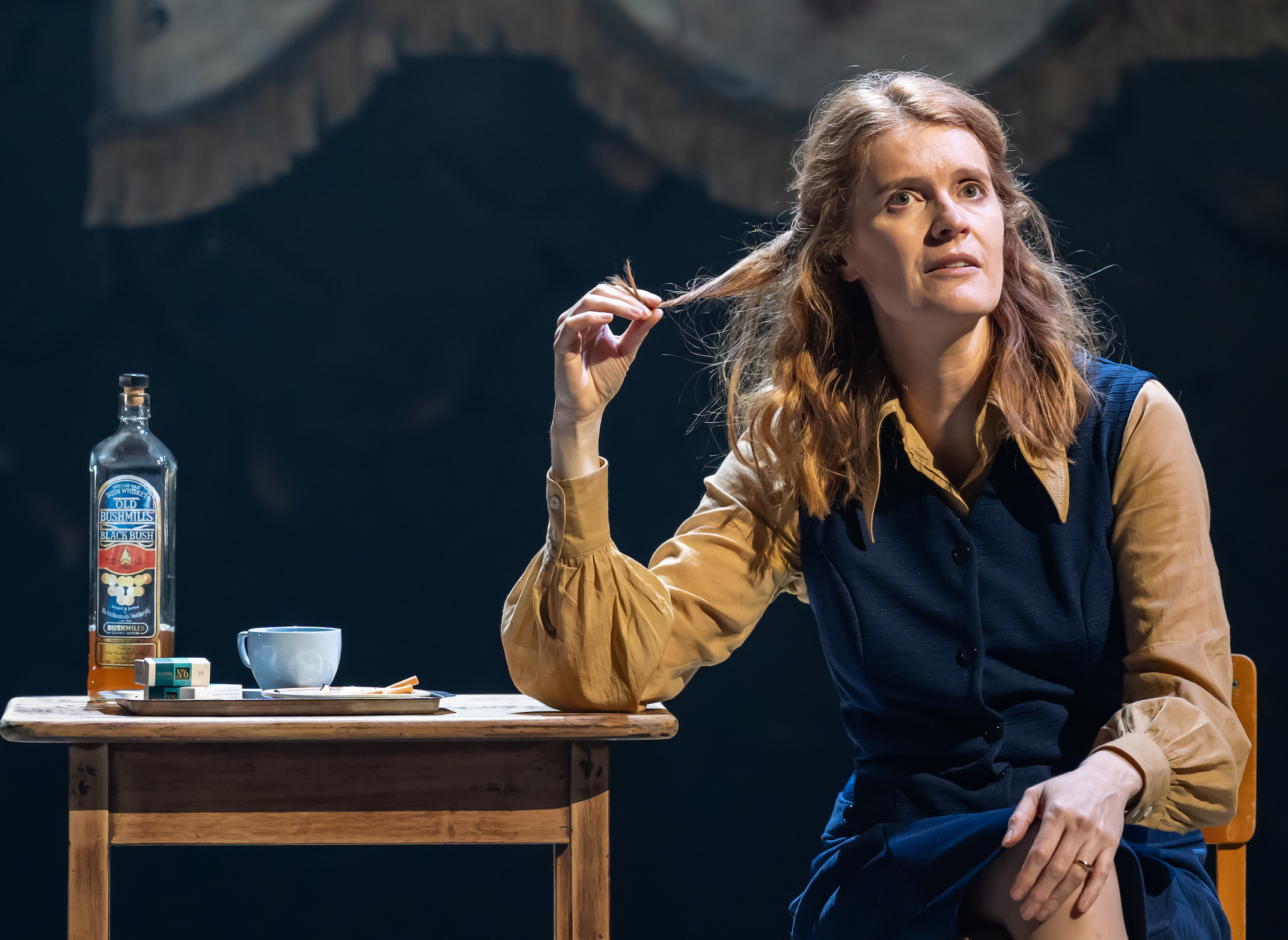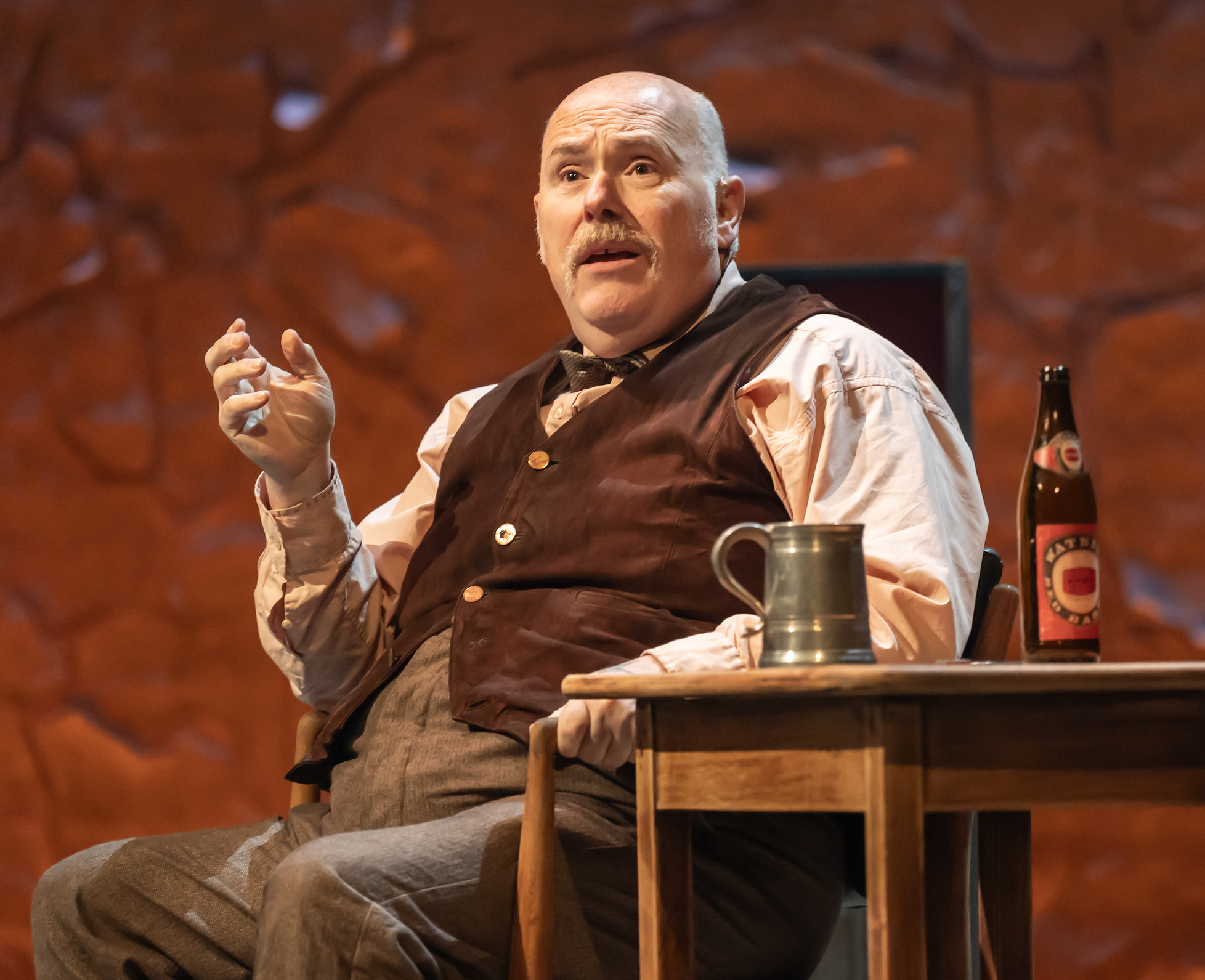Brian Friel’s Faith Healer isn’t noted for its laughs, but Rachel O’Riordan has found more than most directors do in this rich, masterly piece from 1979. Her approach pays dividends in all but one respect.
No portrayal of the deep melancholy of a blighted soul speaks more eloquently than the one Friel has fashioned for his leading man, “The Fantastic Francis Hardy — Faith Healer — One Night Only”, as the poster proclaims. His ramshackle life drags those who love him around the backwaters of Great Britain, though not of his native Ireland, to which he returns only for family deaths. The incantatory list of all the benighted villages where he has “performed", scattered around Wales and Scotland, bursts into the text throughout, an eerie countdown to something terrible.
In the first of the play’s four monologues, Frank, as he is known to his associates, starts the narrative ball rolling, hinting it will end up one dark day in a pub in County Donegal, while he is making a rare trip home. He confesses many things about himself — his despair and drinking as his gift for healing, always sporadic, began to die away. And he sketches portraits of the two people accompanying his performances: his “muleish mistress", Grace, and his dogged manager, Teddy, whose Cockney accent and mannerisms he amusingly has down to a T.
 We hear their monologues next, before Frank returns for his final act. As soon as Justine Mitchell's Grace (pictured right) starts talking, we realise this is a puzzle play, where we will have to weigh up the three characters' competing versions of what has actually happened. All are compelling talkers. Slowly, through their booze-sodden accounts, certain truths and sources of grief are uncovered, some of them chilling.
We hear their monologues next, before Frank returns for his final act. As soon as Justine Mitchell's Grace (pictured right) starts talking, we realise this is a puzzle play, where we will have to weigh up the three characters' competing versions of what has actually happened. All are compelling talkers. Slowly, through their booze-sodden accounts, certain truths and sources of grief are uncovered, some of them chilling.
Friel inserts little markers into this glorious sea of words, details each character repeats that anchor us to their shared experiences, even if they view them differently: the village in Sutherland they visit that’s “as far north as you can go in Scotland”; the crossing from Stranraer to Larne and the drive through the night to the pub in Co Donegal that’s “more a lounge bar, really”. Ballybeg is the nearest village, they all tell us, familiar Friel territory; but Frank has arrived in a zone where savagery rules.
It becomes clear that he has turned into a creator of what Grace calls “fictions”, foregrounding only the successes in his life and refashioning them into myths he can live with, jettisoning the rest: his few cures are overly emphasised, his remarks to her an often cruel repertoire of putdowns from which she learns to shield herself. But Grace has also learned that she needs him to sustain her. (Psychologists would be writing “classic co-dependency” in their notes at this point.) It’s a poignant portrait of a woman running after a man who's running away from himself and only feels whole on the few occasions when he actually can heal somebody. Worse for him is that he knows instantly whether or not he can cure somebody but has to go through the charade of trying when he knows there’s no point.
As the piece proceeds, the notion of a "faith healer" twists and turns. Is Frank actually one? Or he is closer to being an "artist," as Grace sees him, desperate to sustain his vision as his self-doubt erodes and he starts to lose faith in his calling? By the final moments of the play he has found an odd elation in accepting a fate he can’t control, his arms held out, Christlike, his faith in himself restored.
Justine Mitchell as Grace gives the most pitch-perfect interpretation of this role I have seen. We meet her in a Paddington bedsit, jittery and broken, measuring out her life in hours slept, whiskey drunk, cigarettes smoked. Yet she is still a believable beauty from a big house with a long poplared drive, who trained at the bar and adored her patrician father, a judge. When she visited him after his stroke, she recalls, he condemned her for running off with her “mountebank” in the familar flow of words he'd used while sentencing a prisoner in the dock. Without a trace of faux-neurosis, Mitchell takes us deep into Grace’s private world of pain and her love-hate relationship with Frank. She is sadness incarnate, a once-strong woman running on empty.
 By contrast, the monologue from Holder's Teddy (pictured left) is a knockabout comic tour de force. As the English manager who couldn’t abandon his two charges, he is blinded by love for them, however often he repeats his mantra, “Work is work, friends is friends, and never the twain shall meet, as the poet said.” Lubricated by bottles of beer, he becomes louder and camper, his voice suddenly a screeching fortissimo, his gestures studied playacting as he croons along to “The Way You Look Tonight” — the only record Frank owned — and conducts an imaginary band. He evokes a bygone era of music-hall, turned up to 11, where whippets play bagpipes and ladies do turns with pigeons, in absurdist comic writing of the highest order.
By contrast, the monologue from Holder's Teddy (pictured left) is a knockabout comic tour de force. As the English manager who couldn’t abandon his two charges, he is blinded by love for them, however often he repeats his mantra, “Work is work, friends is friends, and never the twain shall meet, as the poet said.” Lubricated by bottles of beer, he becomes louder and camper, his voice suddenly a screeching fortissimo, his gestures studied playacting as he croons along to “The Way You Look Tonight” — the only record Frank owned — and conducts an imaginary band. He evokes a bygone era of music-hall, turned up to 11, where whippets play bagpipes and ladies do turns with pigeons, in absurdist comic writing of the highest order.
It falls to Declan Conlon as Frank to knit the piece together, and it’s here the production’s comparative lightness of spirit sells it slightly short. Everything you need is there in Conlon’s performance — Frank's wit and swagger, the quick delivery of a consummate conman, his serious confessional bursts — everything except, crucially, a sense of danger, of a soul flaming out. If you never saw Donal McCann or Ralph Fiennes in the role, that might not matter, but I missed the brooding, almost demonic melancholy they brought to the character.
Even so, this is another fine achievement for O’Riordan’s Lyric, after her exceptional Beauty Queen of Leenane: an infinitely rewarding piece of theatre that makes the text work its magic all over again.















Add comment